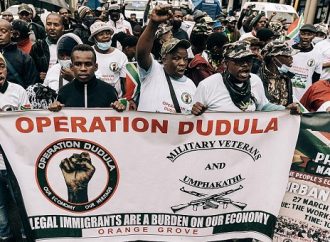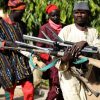Al Jazeera journalist, Shireen Abu Akleh was allegedly shot dead by Israeli forces in occupied West Bank city of Jenin in the early morning of May 11, 2022. There have been several denials by the Israeli authority regarding the culpability of their military. But, as more evidence come to the fore, all pointers seems to
Al Jazeera journalist, Shireen Abu Akleh was allegedly shot dead by Israeli forces in occupied West Bank city of Jenin in the early morning of May 11, 2022. There have been several denials by the Israeli authority regarding the culpability of their military. But, as more evidence come to the fore, all pointers seems to support the claim that the Israeli military deliberately killed Shireen Abu Akleh. The question to ask then is … why? Why would one of the top militaries in the world be scared of a journalist?
WHO KILLED SHIREEN ABU AKLEH?
Shireen Abu Akleh was a Palestinian-American journalist who worked as a reporter for the Arabic-language channel Al Jazeera. She was born in Jerusalem on April 3, 1971. She spent time in the United States, obtaining U.S citizenship through a member of her mother’s family who lived in New Jersey. She attended secondary school in Belt Hanian. She graduated from Yarmouk University in Jordan with a bachelor’s degree in print journalism.
Before her unfortunate death, she lived and worked in East Jerusalem, reporting on major events related to Palestine, including the Second Intifada. Shireen Abu Akleh also covered Israeli politics and reported on funerals for Palestinians killed by Israeli forces. She reported the Battle of Jenin in 2002 and other Israeli operations in the Gaza Strip. In 2005, she became the first Arab journalist allowed inside the Shikma Prison to interview long-term Palestinian prisoners.
The 51-year-old Palestinian-American was killed by a bullet to the head on May 11, 2022 at around 6:30 a.m. She was standing with other journalists near the entrance of the Jenin refugee camp. They had come to cover an Israeli raid. Video footage and audio analysis, shows she was shot from the distance of about 200 meters.
Since her death, the Israeli forces have denied culpability. Israel insist she could have been killed by an indiscriminate gun-fire from the Palestinians militants, or an Israeli soldier returning fire, during a raid at the Jenin camp. However, eyewitnesses say there were no armed Palestinians or fighting in her domain. It is even more disturbing that more than six weeks after the unfortunate incidence, Israeli authorities have not conducted a criminal investigation.
Recent forensic investigation in the United State was finalized and announced by the US State Department spokesman Ned Price who claimed that the bullet was badly damaged, which prevented a clear conclusion on who killed her.
INCIDENCES OF JOURNALISTS KILLED DURING CONFLICTS.
It is very unfortunate that the killing of journalists during conflicts appears to be an endless circle. It seems the end to this sad episode is not in sight. Over the years, many reporters and correspondent covering events as they unfold in conflict zones in different parts of the world have paid the ultimate price of death in the line of duty. These unfortunate incidences are not exclusive to one part of the world or a particular conflict. It is not only widespread, but also recurring. The Asia Pacific region comes first with 681 killed journalists, followed by Latin America with 571, the Middle East with 558, Africa with 466 and Europe with 373.
At least 15 journalists and media workers have been killed in the line of duty since the Russo-Ukrainian War began in 2014 — seven in the war in the Donbas in 2014-2015, eight still since the full-scale Russian invasion of Ukraine in 2022. Six have been Russian, four Ukrainian, one Italian, one American, one Lithuanian, one Irish and one French.
These journalists and media workers are: Andrea Rocchelli (Photojournalist); Andrei Mironov (Interpreter and fixer); Igor Kornelyuk (Correspondent); Anton Voloshin (Sound engineer); Anatoly Klyan (Camera operator); Andrey Stenin (Photojournalist); Serhiy Nikolayev (Photojournalist); Yevhenii Sakun (Photojournalist and correspondent); Brent Renaud (Documentarian); Pierre Zakrzewski (Photojournalist); Oleksandra Kuvshynova (Fixer); Oksana Baulina (Correspondent); Maks Levin (Photojournalist); Mantas Kvedaravicus (Documentarian) and Fredericd Leclerc-Imhoff (Camera operator).
Since the beginning of the Israeli-Palestinian conflict in 1948, many foreign war correspondents, professional journalists have been killed or have died as a result of their reporting. Also, there are journalists whose whereabouts are unknown or whose disappearance is as a result of their reporting.
Here are the names of some of the journalists and other media personnel that have been killed in the Israeli-Palestinian conflict. Ghufran Harun Warasneh (Radio journalist shot in the chest by Israel Defense Forces en route to the job in Hebron); Shireen Abu Akleh (Aljazeera journalist shot in the head by Israeli forces); Yusef Abu Hussein (Radio broadcaster killed in his house by Israeli missile strikes); Ahmad Abu Hussein (Photographer shot in abdomen by Israel Defense Forces); Yaser Murtaja (Video journalist shot in the abdomen by IDF sniper); Simone Camilli (Associated Press journalist killed by live bomb dropped by Israel Defense Forces on a soccer field in the Gaza Strip).
Others are Ali Shehda Abu Afash (Associated Press journalist killed by live bomb dropped by Israel Defense Forces on soccer field in the Gaza Strip); Muhammed Daher (Newspaper editor who was critically injured by an Israeli strike on his house and died 11 days later); Muhammed Nour al-Din-al-Deiri (killed in Israeli bombing of a market in Gaza); Rami Rayan (killed in Israeli bombing of a market in Gaza); Sameh al-Aryan (TV cameraman killed in Israeli bombing of a market in Gaza); Ahed Zaqout (former Palestine national football team player and sports television presenter killed in Israeli bombing of his building as he slept) and Mohammed Abu Halima (Radio correspondent and freelance photographer shot in the stomach by Israel Defense Forces.
More shocking is the fact that over 300 journalists have been killed while covering the Syrian war since 2011. Some of the journalists and media personnel that have been killed in the Syrian war are: Abdul Naser Haj Hamadan (photographer working for the Media Office in Binnish, died in Russian air strike); Abdul Hameed al-Yousef (photographer and camera operator, died in government shelling); Mohammed Hussein Rasho and Saad Ahmed (two Syrian Kurdish journalists died in Turkish air strike on civilian convoy carrying local and foreign journalists); Patryk Skolak (Polish freelance journalist); Mustafa Mohammed (the Syrian Kurdish journalist died in Qamishli from injuries sustained while covering the fighting in Manbij; Ibrahim Al-Omar (Syrian reporter for Al-Jazeera, killed in Russia double tap airstrike while reporting; Zakaria Ibrahim (Al-Jazeera camera operator); Kenji Goto (Japanese freelance video journalist, captured and beheaded by ISIL; Mohammed Al Qasim (reporter for Syrian radio station, killed by unknown gunman while interviewing a rebel leader; Steven Joel Sotloff (American freelance photographer) and James Wright Foley (American freelance photographer).
In Africa, the story remains the same as journalists in the line of duty are losing their lives on a continuous basis. For instance, about 59 radio, print and television reporters operating in Somalia died in the period from the start of the civil war in 1992 to 2013.
WHY WOULD THE ISRAELI WANT TO KILL SHIREEN ABU AKLEH?
Al Jazeera is one of the biggest media organisation in the world and in the Middle East. Given it is based in Doha, the organisation is closer to most of the events that takes place in the Middle East. It’s reporters and correspondents are on ground throughout the Middle East to bring the news happenings in the region to viewers spread across the globe. Thus, the Israeli authorities are not comfortable with the way Al Jazeera is telling the Middle Eastern story “as is”.
Another factor that must have led to the killing of Shireen Abu Ablek is the coverage of the age-long Palestinian-Israeli conflict. The way the Doha-based Media Organisation is disseminating information about this conflict do not go down well with the Israelis. Given Al Jazeera is at the front and centre of every developing story in the region, and immediately beaming this to the rest of the world, it thus makes it almost impossible for the Israeli Information Machinery to distort the truth about the conflict through propaganda or any other manipulative apparatus.
The Israeli it seems want to use the death of Shireen Abu Ablek to send a note of warning to other journalists from covering and reporting its perceived atrocities. It means journalists covering the activities of the Israeli forces in the conflict are doing so at the risk of their lives. This unfortunately could affect the established channels of information in the region.
WHAT CAN BE DONE TO PROTECT JOURNALISTS?
There should be a conceited effort by international bodies and humanitarian agencies to put paid to the spate of killings of journalists serving in conflict’s zones in different part of the world. They should intensify the pressure on political leaders’ military forces and the concerned parties to stop this deliberate and heinous act.
Also, those found guilty of killing journalist on the line of duty should be made to pay for the crime. This measure will deter others from committing like crime. The necessary punishment as stipulated by the law should be meted out to those guilty of killing journalists.
Furthermore, world leaders should make more laws and strengthens the existing ones designed to protect journalists and other media workers reporting in war zones. There should be synergy by the different national governments and international organisations in the efforts and campaign against the killing of journalists in the line of duty in conflict zones and elsewhere.
In conclusion, journalists and other media workers should be able to discharge their duty without fear or favour. The killing of journalists is highly despicable. Business as usual is no longer acceptable. The lives and safety of members of the fourth estate of the realm is not only imperative but it is also sacrosanct. Therefore, we must all do our best to stem the tide of the killing of journalists in the line of duty.
1 comment



















1 Comment
anthony hall
Sunday, May 4th, 2025, 3:49 pmThe Israeli IDF have never been keen on shooting at people who can
REPLYshoot back. Journalists, Paramedics, Hospital Doctors and Unarmed ,
Innocent Men , Women and Children, even Burning Babies Alive. The
Brave Israeli Air Force drops 2,000 lb Bombs on Blocks of Flats . IDF
Drone Operators shoot Gaza`s Children in the Head with Quadricopters.